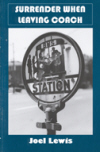Surrender When Leaving Coach
“You’re reading the poems of a man,” Joel Lewis offers in Surrender When Leaving Coach, “who feels all the time / . . . like he’s rooting about / in the ruins of a cheap Pompeii.” Pompeii, for Lewis, is the familiar bus line along Staten Island’s Port Richmond Avenue that he will return to throughout the book, among the other well-worn routes he will cull for the daily strange, the repetitive, the hilarious, and the ephemeral. “Once again my obsession with / the motion of buses, trains and canal boats,” Lewis notes in the title poem of the collection, named for the instructions printed on the old bus tickets of his New Jersey youth. These poems look to the past even as the trains in them lumber to their stations on schedule. “In an absolute theater of time,” Lewis says, “everything happens at once.”
“You’re reading the poems of a man,” Joel Lewis offers in Surrender When Leaving Coach, “who feels all the time / . . . like he’s rooting about / in the ruins of a cheap Pompeii.” Pompeii, for Lewis, is the familiar bus line along Staten Island’s Port Richmond Avenue that he will return to throughout the book, among the other well-worn routes he will cull for the daily strange, the repetitive, the hilarious, and the ephemeral. “Once again my obsession with / the motion of buses, trains and canal boats,” Lewis notes in the title poem of the collection, named for the instructions printed on the old bus tickets of his New Jersey youth. These poems look to the past even as the trains in them lumber to their stations on schedule. “In an absolute theater of time,” Lewis says, “everything happens at once.”
Scattered throughout the collection, Lewis’s series of “Mass Transit Journal” poems catalogues what he notices en route with plenty of over-the-shoulder reading and lively eavesdropped conversations. Thoreau is here. William Carlos Williams mingles with headlines from the Staten Island Advance. A March showdown between “scam guy” and “sharp-dressed business type black guy” on the S46 to Bement Avenue. A lion tamer’s daughter. One crisp morning brings a man puking up his morning coffee—the “hoodie version / of a Roman gargoyle fountain.”
Lewis’s second obsession? The “big maps in [his] head,” the internal reference point he carries with him for how the lines of the familiar landscapes have shifted. “Am I traveling too much / and not really getting anywhere??” Lewis wonders at “2/5, 2:00 pm, 165, Westwood to Hackensack.” “How did I get here?” he asks again in “The Tasks of the Youth Leagues.” Every locality is read and reread like “a dog-eared chasm.” “Though I can recognize the neighborhood,” he admits in “Walking Main Street, Hackensack,” “I can’t be the T-shirt existentialist I once was.”
When William Carlos Williams, another New Jersey poet, wrote of “a red wheel / barrow // glazed with rain / water” he described a slipping way of life. Lewis, too, is interested in past lives in a collection where “nothing sits still” and “each curb” is “a sinking world.” Lewis waves “A thick goodbye to old Hackensack Saturdays / with farmers swarming off up-county’s / Susquehanna trains.” An old New Jersey market town, Hackensack has seen its Main Street institutions close down but manages to hold onto The White Manna, a local greasy spoon. “Some people say Hackensack / should shut down if / ‘the Manna’ closes” a resident tells Lewis, the local version of Byron’s “when falls the Coliseum.” In Lewis’s homage to Williams, “so much depends” on the bun and patty:
the secret
to life is White Manna’s
potato flour hamburger rolls the color
of Cheetos – which contrasts nicely
with that oniony blotch of
Meat Patty X.
Against this backdrop, Lewis introduces external voices, perhaps plucked from his reading as the train stop-starts up the long avenue. We meet Spanky Bannon, of the Mariana, Arkansas Jones Bar-B-Que, in “Spanky Bannon Removes His Famous Pan-Fried Bologna Sandwich from the Menu.” “It was too much trouble / for a buck,” Bannon explains. “People wanted mustard. / People wanted mayonnaise.” And Hector Boiardi, owner of his family restaurant in Cleveland, who in trying to keep up with the popularity of his savory spaghetti became Chef Boyardee of Spaghetti-o fame. As for the old family name, Boiardi says: “sacrifices were necessary for progress.” Though energized by his travels, Lewis’s profile poems, like those of Bannon and Boiardi which break their own words into nuanced lines, subtly bemoan what has been lost. The visit to Hackensack ends with a somewhat disgusted Lewis headed back to the station “walking as if I’ve stepped / in dogshit.”
Lewis is the expert of weaving supreme detail (“the waitress with the baking soda hair” or “Manhattan’s cubic zirconium nightscape”) with a well-placed lull. A hush, for instance, in the midst of a party: “I was there, but barely. / You were there as a lovely / human snow.” Part collector, parts gleeful participant and historian, Lewis has been described as a descendent of Walt Whitman and William Carlos Williams or of the “New York School,” but I don’t know that Lewis would map himself this way, as a trajectory of here to there. No tale in Surrender When Leaving Coach ends quite like you think it will. There is always new territory to cover, new items as in “A Hole in the Wallet,” to add to the “laundry bag / of sub-factoids”:
Some happy
blank land may be
out there and there just might be
roadmaps for purchase
The collection ends on a New Jersey train just as briskly as it began, with a fresh map and a nagging question.





